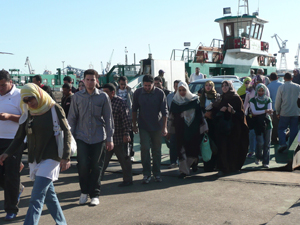 Maryse Louis, general secretary of FEMISE (Euro-Mediterranean Forum of Economic Institutes) and programs manager of the ERF (*), is one of the contributors of the annual FEMISE report (the Euro-Mediterranean partnership at a crossroads), contributing to a chapter on migration in the Euromed region.
Maryse Louis, general secretary of FEMISE (Euro-Mediterranean Forum of Economic Institutes) and programs manager of the ERF (*), is one of the contributors of the annual FEMISE report (the Euro-Mediterranean partnership at a crossroads), contributing to a chapter on migration in the Euromed region.
Econostrum: Why do inhabitants of the southern Mediterranean migrate?
Maryse Louis: There are a number of reasons. Political, social and economic reasons are currently the most important ones in the Euromed region. The countries of the southern Mediterranean are characterised by high unemployment, with less than one in two people legally employed, and stark inequality in salaries.
University-educated people are often paid a lower salary in the public sector than the wages earned by people working in the informal market. In Egypt, doctors earn less than plumbers. In Europe, the same doctors can earn a lot more and have much better career prospects !
Econostrum: Why has there been such a large migration of Tunisians to the Italian island of Lampedusa?
Maryse Louis: Tunisians only have to travel 300km to see a seven-year increase in life expectancy and a GDP per person five times greater than in their home country. There is a significant gap in terms of salaries and quality of life, which in turn has an impact on an individual’s health and career.
As long as southern Mediterranean countries continue to develop at a snail’s pace, particularly from a social perspective, people will keep migrating. In addition to these fundamental reasons, there is also a current phenomenon: the tensions in Tunisia following the revolution and the reduced control of border police have created a window of opportunity, with those who want to leave seeking to take advantage of a seemingly ideal time to do so.
Econostrum: What are the broad trends of North-South migratory flows?
Maryse Louis: 82% of migrants from the Maghreb migrate to European countries and 13% travel to Arab countries, whereas Egyptians tend to favour the countries of the Arab Gulf. 90% of Turkish migrants go to Germany. The countries of the southern Mediterranean have signed trade and capital agreements with the EU.
I don’t see why it’s not possible to do the same thing with migrants. Such a process would have to involve general regional agreements supplemented by bilateral agreements and would have to reconcile supply and demand, but without causing southern Mediterranean nations to suffer a ‘brain drain’, which would hinder their development. Cash transfers from migrants help countries to develop.
Remittances currently account for around 15% of export revenues, and are worth more than private investment in Jordan, Lebanon and Egypt.
Econostrum: What benefits does this migration hold for European countries?
Maryse Louis: Migration helps to mitigate the negative effects of the ageing of Europe’s population. In thirty years’ time, Europe will be suffering from a labour shortage due to the reduction in the working population aged between 15 and 65, unless Europeans are prepared to work up to the age of 80!
Questions of migratory policy, which have been taboo within the European Union for the past decade, are coming to the forefront, and we are now sensing an increasing level of awareness with regard to this issue.
(*) Economic Research Forum in Cairo
The “Partenariat Euro-Méditerranéen à la croisée des chemins” report can be downloaded from the Femise website.
Photo Econostrum-DR
Article by Nathalie Bureau du Colombier, Econostrum. More articles of the “Grand Angle” can be found at the following address:www.econostrum.info. Registration for the Econostrum newsletter is available here:http://www.econostrum.info/subscription/


